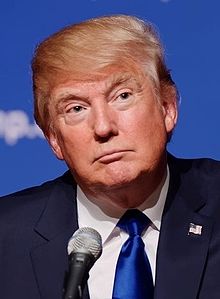
News and Commentary.
Whatever you’re opinion of the election outcome, at DRONELIFE we’re focused on the drone industry. Making a few projections based on the direction that the party and Mr. Trump have taken, here’s our take on what a Trump presidency might mean for the drone industry; both the good and bad.
Border Patrol
If there’s one thing that Mr. Trump has been clear about, it’s the need to secure the nation’s borders. Trump has discussed the various ways that he plans to support the border patrol – and running mate Mike Pence told Fox News that “Building the wall, establishing border security, has to be job one,” on the first day of his announced candidacy.
While the right way to accomplish Trump’s goal is a subject of hot debate, there is no doubt that more resources and support for the border patrol means a big opportunity for commercial drones. In fact, drones offer so much potential for border security that the Department of Homeland Security held an “industry day” in Silicon Valley this summer. The day was an effort to connect DHS with drone startups, and encourage them to develop technology that can help Customs and Border Protection use drones for surveillance, monitoring and tracking. DHS will award eligible companies with funding of $50,000 to $200,000 over a three- to six-month period. With a Trump presidency, that funding could certainly increase; and greater government opportunities for the drone industry could appear.
And Trump may also invest in anti-drone technology. Tech magazine Recode reports today that US Border patrol is using huge, low-altitude blimps to detect smaller drug-smuggling drones flying over the border from Mexico.
Trade Reform
“When Donald J. Trump is president, China will be on notice that America is back in the global leadership business and that their days of currency manipulation and cheating are over,” says Trump’s website, in the section explaining his proposals for U.S.-China Trade Reform. “We will cut a better deal with China that helps American businesses and workers compete.”
As part of his proposal, Trump plans to adjust the corporate tax structure and tariff agreements in an effort to bring manufacturing back to the U.S. and to level the playing field for U.S. products. If elected and successful in all or a portion of his China plan, the effect on the drone industry could well be dramatic. Currently, most of the top drone manufacturers selling in the U.S. are based in China, and U.S.-based companies like 3DR have moved their manufacturing there in order to compete.
While some of Trump’s proposals may prove a boon to the drone industry, a Trump presidency could have some downside: should drone regulations become more focused on privacy issues or a “small government” platform give more power to individual states the drone industry could suffer as a result.
Privacy and Security
When asked – in a discussion relating to the Common Core and the availability of student data – about privacy, Trump was crystal clear: all loopholes that allow personal data to be mined must be closed. “I would close all of it,” Trump stated emphatically. “You have to have privacy. You have to have privacy.”
But how far might Mr. Trump’s focus on privacy concerns go? The drone industry has recently seen a spate of politicians discuss privacy as they plan drone regulations – and the focus on the potential (if unlikely) risks can sometimes outweigh the focus on the potential economic benefit that the drone industry has to offer. If privacy concerns lead to regulations that limit commercial drone applications, the industry could be negatively affected.
States’ Rights
States’ rights for drone regulation seems to be a bi-partisan issue. It was Democrat Dianne Feinstein from CA who argued forcefully against the “Preemption” clause – a clause establishing the authority of the FAA to regulate airspace – in the Senate’s version of the FAA Reauthorization Bill. But as the FAA and industry stakeholders point out, a “patchwork quilt” of drone regulations that differ across all 50 states will make it difficult for national drone businesses to flourish.
Miriam McNabb is the Editor-in-Chief of DRONELIFE and CEO of JobForDrones, a professional drone services marketplace, and a fascinated observer of the emerging drone industry and the regulatory environment for drones. Miriam has penned over 3,000 articles focused on the commercial drone space and is an international speaker and recognized figure in the industry. Miriam has a degree from the University of Chicago and over 20 years of experience in high tech sales and marketing for new technologies.
For drone industry consulting or writing, Email Miriam.
TWITTER:@spaldingbarker
Subscribe to DroneLife here.